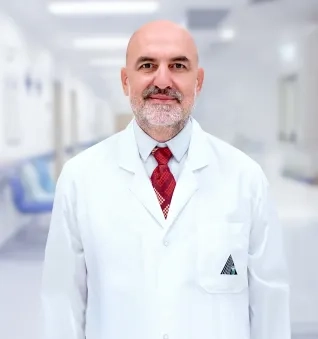HIFU Focal Treatment for Prostate Cancer
With the newly developed focal treatment, the tumor focus in prostate cancer is destroyed by burning. According to Yeditepe University Hospitals Head of the Department of Urology Prof. Dr. Faruk Yencilek, in this way, the side effects that can occur in classical surgery and radiation treatment are not seen and the cancer focus can be eliminated.
Prostate cancer, which is very common in men worldwide, ranks first among men in the USA. Every year, 650-700 thousand men in the USA and 350 thousand of men in Europe are diagnosed with prostate cancer. Prostate cancer is found in 24 percent of men diagnosed with cancer.
Emphasizing that prostate cancer ranks second after lung cancer in our country, Yeditepe University Koşuyolu Hospital Chief Physician and Urology specialist Prof. Dr. Faruk Yencilek continues his words as follows: "On average, one in every 12 men is diagnosed with prostate cancer. It is estimated that around 30 thousand men are diagnosed with prostate cancer every year in our country. However, only 4-5 thousand of them can be diagnosed. The most important factor in this result is not being sufficiently aware of early diagnosis and screening methods."
Factors Increasing Risk of Prostate Cancer
The definitive risk factors for prostate cancer are increasing age, ethnicity, and genetic factors. The incidence of prostate cancer increases with age. While prostate cancer is seen in one in 10 thousand men under the age of 40, this rate increases to 1 percent in the 40-60 age group. Over the age of 60, it is seen in one out of every eight men. Another risk factor is the ethnic origin. In the world, prostate cancer is most common in African-Americans (black Americans). This is followed by white Americans and European countries.
While the rate of prostate cancer is 65 per 100,000 in Europe, this rate is 37 per 100,000 in Turkey. Another important factor is genetics. This disease is a type of cancer that has the potential to be passed from father to son. If a person has first-degree relatives with prostate cancer, the risk of developing prostate cancer is twice as high. The risk increases five times if there are two relatives and 11 times if there are three relatives.
What Are the Symptoms of Prostate Cancer?
There is no specific symptom of prostate cancer. Prostate cancer cannot be diagnosed based on a complaint. Any finding that may suggest benign prostate enlargement may also be a finding for malignant prostate cancer. These findings relate to benign prostate enlargement such as difficulty urinating, bifurcating, intermittent urination, and feeling as if there is urine behind after urinating, frequent urination at night can also be a symptom of malignant enlargement. Sometimes people can develop prostate cancer without any symptoms.
"Focal" Care in Treatment
Stating that the most important point in patients diagnosed with prostate cancer is the staging of the disease, Yeditepe University Koşuyolu Hospital Chief Physician Prof. Dr. Faruk Yencilek continues his words as follows: "Because the treatment approach changes according to the stage of the disease. Today, more and more prostate cancers caught at an early stage (limited to the prostate) have brought new treatment approaches.
Previously, only surgery or radiotherapy was applied to all tumors limited to the organ, but now the concept of "Focal Treatment" has entered the literature and practice in the world. Focal Treatment (HIFU) allows the patient to get rid of cancer in early-stage tumors that have not spread outside the prostate while reducing the likelihood of complications of the disease. In other words, in this method, the tumor focus caught early in the prostate is destroyed by burning."
Be aware of these!
- Prostate cancer screening is performed with PSA and rectal touch examination.
- If cancer is suspected, ask your doctor for a Multiparametric Prostate MRI.
- Have your prostate biopsy under mp-MRI guidance.
- If you have prostate cancer, ask your doctor the following questions: Is cancer local, i.e., limited to the organ, locally advanced (beyond the prostate but not spread elsewhere), or metastasized (spread elsewhere)?
- If it is local, find out which risk group they are in (low, medium, high). If they are in the low and medium-risk group, be sure to discuss HIFU treatment.
About
Faculty and Year of Graduation:
Marmara University Faculty of Medicine, 1996
”
See Also
- ThuFLEP Treatment Improves Quality of Life in Benign Prostatic Hyperplasia
- Treatment of Urinary System Stones with Thulium Fiber Laser
- ThuFLEP Method in Benign Prostate Enlargement
- What is Prostate Cancer? Symptoms and Treatment
- What is Benign Prostatic Hyperplasia, How is it Treated?
- Early Diagnosis Saves Lives in Insidiously Progressing Kidney Tumors
- The Rate Of Kidney Stones Has Begun To Increase In Women
- HoLEP Eliminates 85 percent of Drug Use in the Treatment of Benign Prostate Enlargement
- Chronic Pelvic Pain
- Does Prostate Enlargement Develop into Cancer?
- One in Every Four Men Diagnosed with Cancer Has Prostate Cancer
- Ways to Protect Prostate Health
- Surgical Treatment of Prostate Diseases
- Ways to Get Rid of Kidney Stones
- Prostate Preventive Cancer Treatment: Focal HIFU
- The Things You Should Know About Prostate Cancer
- HoLEP Method in Closed Prostate Surgery
- Benign Prostate Enlargement
- Who Can Undergo HoLEP Procedure?
- Gold Standard Treatment for Benign Prostate Enlargement: HoLEP
- 6 Misconceptions About Kidney Stones
- Her Kidney Stone, 6 cm in Size, Was Taken With One And a Half Hour Operation
Alo Yeditepe





